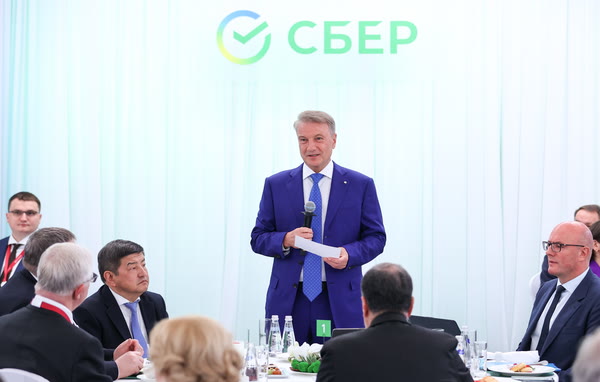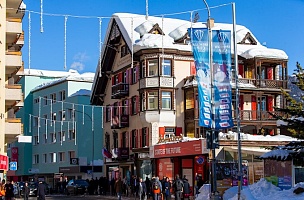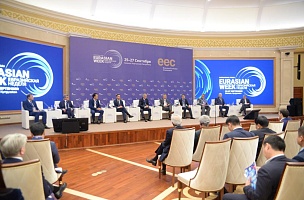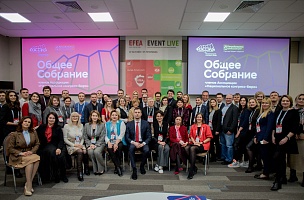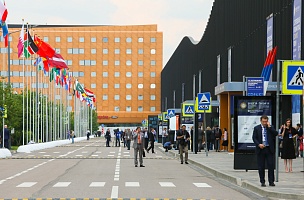KEY CONCLUSIONS
Unprecedented Sanctions Against Russia Will Increase, More Must be Done to Adapt the Economy to the New Conditions
“The sanctions that have been imposed are unprecedented, and they are affecting a large part of the economy. Countries that have imposed sanctions against Russia account for 56% of exports and 15% of GDP is at risk. […] There are plans to increase sanctions even further with the EU looking to reduce the purchase of Russian oil by up to 90% by the end of 2022. The EU plans to abandon Russian gas completely by 2027. […] The enormous task of adapting the entire structure of the economy awaits us. The main challenge will be to ensure the economy is restructured, which is something we haven’t succeeded in doing for many years. […] We are now faced with this huge challenge: to finally make the transformational leap we’ve been trying to make for decades, and to do it in different macroeconomic conditions,” Herman Gref, Chief Executive Officer, Chairman of the Executive Board, Sberbank.
“We have no other choice but to restore the old economic structure. If we do not restore the old [economic structure – Ed.] now, there will be nothing left to build a new one with,” Alexey Mordashov, Chairman of the Board of Directors, Severstal.
“The structure of the economy will change. We really can efficiently produce and supply minerals, metals, chemicals. […] We need to keep doing what we are capable of doing efficiently and look for partners to import machines and equipment. Yes, it will shrink, and we will develop our own technology, but that doesn’t mean that we’ll be able to produce all the technologies we need for a market of 220 million people, if we take the Eurasian space,” Maksim Reshetnikov, Minister of Economic Development of the Russian Federation.
PROBLEMS
Not all of Russia’s Exports Can be Redirected to Other Markets
“We won’t be able to redirect [all export flows – Ed.] to other markets. Oil is going, but the oil products we were supplying to Europe fell by the wayside, and refineries are under-utilised. And actually, the oil’s moving to the East, because Kuzbass coal has been brushed aside,” Maksim Reshetnikov, Minister of Economic Development of the Russian Federation.
“The most serious constraint is on logistics. There has been a drop [in volumes – Ed.] in maritime traffic, and a six-fold drop in container traffic. We can see a less rational reallocation of logistics to road transport and, of course, huge difficulties with air traffic,” Herman Gref, Chief Executive Officer, Chairman of the Executive Board, Sberbank.
“We were in a colonial technological dependency in the global technology distribution chain, and we were buying boxed solutions. Oftentimes our own scientific discoveries formed the basis of technologies that were being sold back to us at high prices. [...] We got hooked on technology, and [at present – Ed.] transitioning to our own technology is a painful process,” Dmitry Chernyshenko, Deputy Prime Minister of the Russian Federation.
Currency Restrictions Will Hamper Russia’s Economic Development
“Currency restrictions, in my opinion, are a serious deterrent. Because we need to rebuild the chains and we need more freedom, opportunities to pay abroad and leave money there. We’re talking about an overly strong rouble - we need to abolish currency controls and push funds abroad by all means necessary. [...] We need to abolish barriers as much as possible everywhere. A lot is being done, but it’s not enough. We need market freedom,” Alexey Mordashov, Chairman of the Board of Directors, Severstal.
“As of 1 May, companies have RUB 43.2 trillion in their accounts. More than 26 of them are in deposit accounts, and the problem is that business isn’t investing this money simply because the risks are completely different. Businesses are averse to risks. The only money they are willing to risk is the government’s,” Andrey Makarov, Chairman of the Committee on Budget and Taxes of the State Duma of the Federal Assembly of the Russian Federation.
SOLUTIONS
National Programmes Continue Regardless of Conditions, Incentives are Introduced in Support of Import Substitution
“We must create normal conditions for real business and not interfere. There are programmes, national projects – there’s no need to start slashing. We can act calmly. This is an investment in our country, and regardless of what happens, it will pay off,” Maksim Reshetnikov, Minister of Economic Development of the Russian Federation.
“There should be zero interest rates on purchases of equipment from abroad – with zero import duties and a government guarantee for the principal body of the loan. There is a need for drastic measures – super soft monetary policy. There should be a buyout of cash liabilities from the markets, of infrastructure projects of varying levels of business and through their bonds, and in this way [there will be – Ed.] financing for development,” Boris Titov, Presidential Commissioner of the Russian Federation for the Protection of Entrepreneurs’ Rights.
“We need tax incentives and lower rates on certain taxes for those who produce the products we need now, which we are getting less of because of the restrictions. The same goes for subsidies: import restrictions should be stimulated by subsidies. We should be helping importers. There are plenty of similar kinds of solutions. This year we are allocating three trillion rubles in excess of the plan for these kinds of solutions,” Anton Siluanov, Minister of Finance of the Russian Federation.
Read more in the the ROSCONGRESS.ORG Information and Analytical System.


